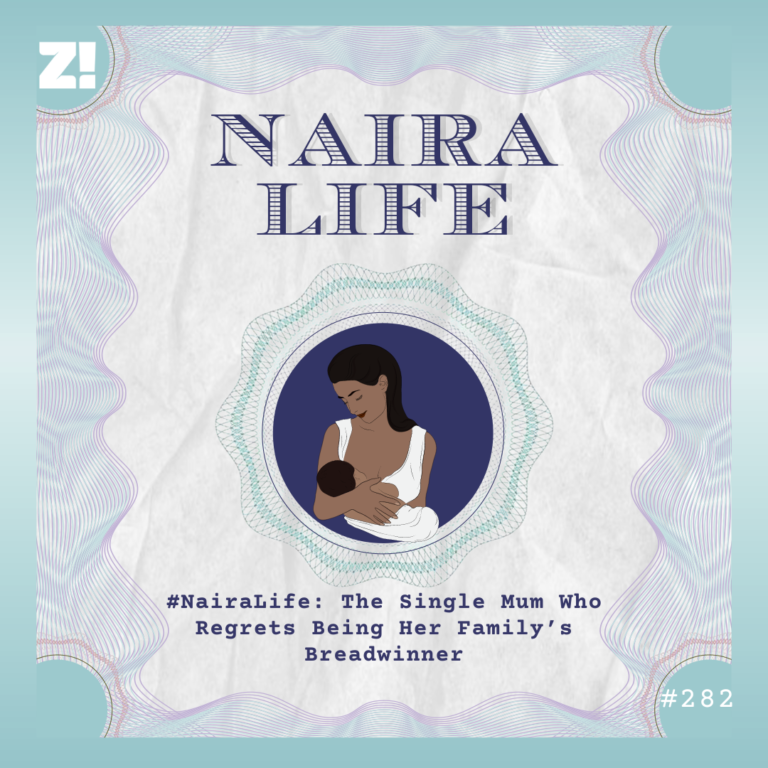If you ever want my mum to talk for three hours non-stop, just ask her about Igbo soups. She’d be more than happy to launch into a monologue about how they’re all better than freshly made agege bread.
These soups originated from the Southeastern part of Nigeria and have a basic naming formula. “Ofe” means “soup” in Igbo, and it’s usually followed by the main ingredient in the soup — a vegetable. So if you want to be doing fitness, eat plenty Igbo soups.
I had time to kill recently, and wanted to do the Lord’s work, so I asked my mum what the best Igbo soup recipes were. What followed was a mini cooking show/life therapy session. According to my Igbo mum, this is the best way to cook your favourite Igbo soups.
PS: It’s her words from this point on.
Ofe Oha (Oha soup)
Image source: Lyndishes Kitchen
First things first, you can’t manage resources with this soup. It’s better to borrow money than to eat oha soup that’s begging for life. And if you know how to price well at the market, you won’t need to finish your money.
What you’ll need for three to four servings
- 2 cups of hand-chopped oha leaves
- 1 cup of knife-chopped uziza leaves
- 1 cup of ground crayfish
- 2 or 3 yellow scotch bonnet peppers
- 1 tablespoon of ogili isi
- Half a cup of cocoyam paste or 2 tablespoons of achi
- Half a cup of palm oil
- Meat
- Stockfish and dry catfish
- Salt and seasoning cubes
Preparation
- Thoroughly clean your stockfish with warm water — not hot, you don’t want all the taste to disappear, and not cold or it might not take out all the dirt from market storage.
- Boil it with your cleaned meat in a little water, so they’ll get soft together. The water should be just enough to slightly cover the meat and stockfish because the meat will bring out its own fluid when heated.
- Season well. You notice I didn’t mention onions. It can overpower the soup’s taste, so we usually don’t add it.
- Clean your dry fish and add it to the meat when it’s tender. If the meat stock is drying up, add about a cup of water to it.
- Grind the pepper and add it to the pot of steaming meat and fish. Yes, Igbo people like pepper too, but it shouldn’t drown out the taste of your soup.
- After about five minutes, add palm oil and cocoyam paste in large lumps. If you can’t get cocoyam, use achi. But make sure you use good achi or your soup would be watery. How do you get good achi? Befriend the market women so they don’t sell rubbish to you. Drop all your phonetics, ask them about their children and see if they don’t become your friend. Phonetics won’t take you everywhere.
- Add the ogili isi and crayfish. Be more generous with crayfish than politicians are when election is near. Cook for about three minutes.
- Check for salt and seasoning, and add more if necessary.
- The soup should be thickened by now, so wash and add the chopped uziza leaves and stir.
- Remember when I said the oha leaves should be hand-chopped? Cutting it with a knife might make the leaves hard, so just use your hand to tear them into large pieces — small pieces will just disappear into the soup because the leaves are very delicate — when it’s almost time. Wash with water, and add to the soup.
- Reduce the heat, stir and cook for about five more minutes.
- Scoop out and chew a cooked oha leaf to confirm the soup is ready — it should be tender.
- Enjoy your soup with any swallow except amala. Amala is just wrong with this soup, please.
Ofe Owerri
Image source: Dooney’s Kitchen
This is what you cook when you want to buga to your enemies and let your amebo neighbours know you serve a living God. You must have money to cook Ofe Owerri. It’s not just soup. It’s a sign of prosperity.
What you’ll need for three to four servings
- Half a cup of finely shredded okazi leaves
- Half a cup of shredded ugu leaves (optional)
- 2 or 3 yellow scotch bonnet peppers (ground)
- Quarter cup of cocoyam paste (from the round Owerri ones)
- 1 cup of ground crayfish
- 1 tablespoon of ogili isi
- Half a cup of palm oil
- Assorted meat
- Snails (optional)
- Stockfish and dry fish
- 2 onions (sliced)
- Salt and seasoning cubes
Preparation
- Season the stockfish, snails and meat with salt, seasoning and onions. Boil with half a cup of water. The stock will serve as the soup’s base, so it has to be tasty. A bland stock is just like using low-quality Hollandaise fabric to sew the best style. Whatever the style, the cloth will still spoil. Buy real Hollandaise.
- When the meat is tender, add dry fish, crayfish, pepper and palm oil. Allow to cook for five minutes, then reduce the heat.
- Add in the cocoyam paste gradually, and stir as it thickens. The soup shouldn’t be so thick. Easy does it; remember this when applying make-up too.
- Add the ogili isi and allow to cook for three minutes. If too thick, loosen with meat stock or water. Make sure to keep tasting for flavour and adjust the seasoning as necessary.
- Add the washed okazi, and let it cook for two more minutes before adding the washed ugu leaves. If you don’t want ugu, just allow the soup to simmer for a bit.
- Proceed to enjoy your soup with any swallow — again, not amala — and remember to open your windows so your neighbours can perceive the goodness of God in your life.

RELATED: These Are the Easiest Nigerian Soups to Make, According to Ifeoluwa
Ofe Onugbu (Bitter leaf soup)
Image source: All Nigerian Foods
This soup is proof that not everything sweet is good. I don’t know if it’s a proverb, but if you eat any bitter leaf soup that’s “sweet”, something is wrong somewhere. Sometimes, the best things in life will challenge you and your tastebuds.
What you’ll need for three to four servings
If you still haven’t gotten it yet, most of the ingredients you’ll need for Igbo soups are the same. The only major difference is the vegetable.
- 1 cup of properly washed bitter leaves
- 2 or 3 yellow scotch bonnet peppers (ground)
- Quarter cup of cocoyam paste or 2 tablespoons of achi
- 2 tablespoons of ground crayfish
- 1 tablespoon of ogili isi
- Half a cup of palm oil
- Meat
- Stockfish and dry fish
- Salt and seasoning cubes
Preparation
- Season your meat and stockfish as usual. This soup doesn’t need onions, but you can add a little to boil your meat if you like.
- Once the meat is tender, add some water to loosen the stock. Add the cleaned dry fish, crayfish, pepper and palm oil. Allow to cook for five minutes then reduce the heat.
- Add the cocoyam paste gradually and stir as it thickens. You can make the soup as thick as you want, but remember, too much of everything isn’t good.
- Proceed to add the ogili isi and taste for seasoning. Allow it to cook for about three minutes before adding the washed bitter leaves. If you don’t know how to wash it, check here. Don’t be like my children who are too scared to taste the washed leaves before adding to the pot. How else will you know if it’s still too bitter?
- Once added, allow it to cook for some minutes till the leaves are somewhat tender.
- Bitter leaf soup is versatile and can withstand multiple rewarming if necessary. Is your prayer life as versatile?
Ofe Nsala (White soup)
Image source: Ollarica
In Igbo land, we cook this soup for nursing mothers during the omugwo (post-childbirth) period. We also use fresh catfish instead of meat, but only rich people buy catfish now, so make do with what you have. Contentment is godly (except when cooking oha or ofe owerri, sha).
What you’ll need for three to four servings
- Chicken (or any meat you have).
- 2 or 3 yellow scotch bonnet peppers (ground)
- 2 big slices of yam
- 2 tablespoons of ground crayfish
- 1 teaspoon of ground uziza and ehuru seeds
- 1 small chunk of ogiri okpei
- Half a cup of uziza leaves
- Quarter cup of utazi leaves
- Meat
- Stockfish and dry catfish
- Salt and seasoning cubes
Preparation
- At this point, you should already know to season and boil your meat and stockfish. Boil the yams in a separate pot of water, and pound it in a bowl when tender.
- When the meat is tender, add some water to make room for the soup, then add the cleaned fish, crayfish, ogili okpei, ground seeds and pepper.
- Let this cook for three minutes before adding the pounded yam in small lumps. This will serve as the soup’s thickener.
- Stir the soup until the yam dissolves. Don’t stir too much though, so the fish doesn’t scatter.
- Add the washed utazi and uziza leaves. Be careful with the utazi as it’s quite bitter. Put it in gradually and taste as you go. Patience is a virtue in life, especially when cooking nsala.
- After adding the leaves, allow the soup to simmer for two minutes.
- Please, only serve with pounded yam. It’s the law.
NEXT READ: What Your Favourite Soup Says About Your Sex Life




